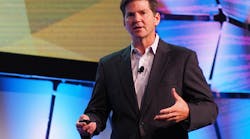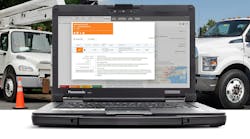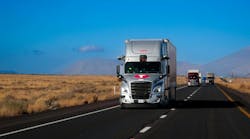It's an era of compelling improvements in trucking, and by applying technology that exists now or will in the near future, the industry could "double down" on gains made in recent years, says PeopleNet President Brian McLaughlin.
He shared some thoughts on what's possible going forward — and how to achieve it — at the opening session of PeopleNet's 13th annual User Conference Tuesday morning. The fleet mobility technology company's opening act for the conference included a look at the history of trucking going back 120 years to the horseless carriage and the first "semi."
McLaughlin said the transportation industry already has many of the tools it needs to make the kind of landmark advancements other industries have. In a series of analogies, he noted that perhaps the biggest change in transportation was space travel, and recalled the inception of NASA's Space Shuttle program.
"Imagine you're the engineer sitting in a lab and your boss comes in and says, 'Okay, I've got a challenge for you. We've got 185,000 tons; we need it to go 17,500 mph in 8 minutes or everybody dies. You in?' And they reinvented space travel," McLaughlin told the audience. "The same rules apply to us in terms of how things have been rethought and technology has enabled a new way of doing things."
Space travel also provides the transportation industry a theoretical goal on which to set its sights: frictionless freight. "It's no barriers," McLaughlin said. "Transportation is really quite simple: move a good from A to B. How do we remove all the barriers that get in your way so we can move things better?"
"Our hypothetical for the next five or so years in terms of what needs to happen in removal of barriers comes down to one word and one thing: Friction," he continued. According to PeopleNet, the "friction points" in trucking fall into categories of drivers, regulations, freight, safety and fuel.
"How can we take out the barriers or friction points that keep you from going from A to B?" McLaughlin asked.
The next level
The PeopleNet president said the trucking industry, which he noted was the first to utilize the Internet in its operations, has reached new milestones in performance and efficiency thanks to applied technology. He also pointed to the accelerative change that's been taking place around mobile devices and technology in the past decade or so.
For perspective, McLaughlin quoted Thomas Friedman, author of The World Is Flat. Reflecting in 2012 on when he started writing that book in 2004, Friedman commented that "Facebook didn't exist, Twitter was still a sound, the cloud was still in the sky, 4G was a parking place, LinkedIn was a prison, applications were what you sent to college and Skype was a typo."
Yet those things are now practically ubiquitous and changed the way many people communicate and even run their lives. "This is 10, 11 years in some cases; this isn't a lifetime," McLaughlin said. "It's crazy what's happening out there."
The transportation industry is seeing "unprecedented, sustained" imbalances of demand to move goods and the ability to move them, he added, but the question is whether it's a driver problem or a capacity problem. There's about a 30% shortfall in the industry's current capability to meet demand, McLaughlin said, and "20% is more than likely waste and inefficiencies."
"We could do better in balancing the capacity by assigning loads, by routing and by driving the vehicles more efficiently," he contended. "These are things that we can do to address this challenge. We've already removed a lot of these friction points, but the question is, how do we take it to the next level?"
Mobility, connectivity, intelligence
McLaughlin laid out a course for trucking's future that includes more connectivity, mobility/mobile devices and business intelligence. "There are now over 30 billion things connected in the world, so this is not a new phenomenon," he said. "How do we get more and more of that truck and driver connected?"
Part of the solution could come with the trend toward making trucks into mobile wifi hotspots through which the vehicles' range of sensors and other data-gathering devices might be linked. "There are dozens of things that we can begin to connect through a central gateway off that truck," McLaughlin said. "Tires, fuel, parts, whatever it might be — how do we wrap these in and drive them to higher value?"
The trucking industry is poised to tap that central information gateway to provide a better understanding of driver health and wellness and safety measures, he noted. "All these connection points are going to become more and more pervasive," McLaughlin said.
Meanwhile, mobile devices — and more types of them — are becoming more common, with some predictions that the average person will have seven mobile devices in 2020. McLaughlin said the technology needed already exists in many cases, it's just putting the elements together and fleets embracing what's possible.
"When you bring together mobility and connectivity, you start to build smart roads," he said. "Or you start to have smart lanes that can adapt based upon congestion and traffic. Or you have smart [road] lines that can illuminate at night or in bad weather. Or you have smart [traffic] lights that can adjust based on traffic patterns and congestion.
"This is all doable," McLaughlin emphasized. "And if you could connect it into a smart city concept, you could start to see load planning and load optimization in real time as a truck enters a certain point of geography, whatever it might be."
He described a continued progression toward greater data sophistication, using an example of a truck sending fuel use and efficiency information. "Where things have gone and where they're going is we'll have a much richer data set," McLaughlin said, adding, "Let's take topography, let's take driver age, let's take vehicle age, weather patterns, load weight — let's take all those things and begin to drive more effective decisions."
Telematics and fleet management systems already have brought a number of marked performance improvements to fleets like better fuel efficiency, lower emissions, fewer collisions and streamlined maintenance. "A connected truck today has already gained some very significant increases across the board," McLaughlin noted.
"Where do we go in the future? We feel we can double down on [gains that have been made]: 50-70% increases in each and every one of these areas just by deploying the technology capabilities we're going to see in the next five years," he argued.



